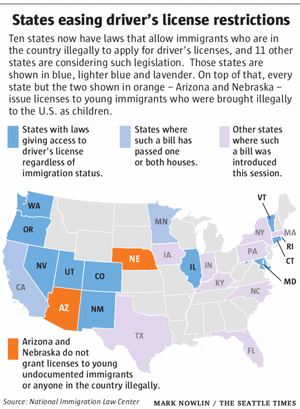
Several notable developments took place in states across the U.S. in 2016.
In California, several recently passed immigration-related laws–collectively known as the “California Package” –are now being implemented. For example, a law that extends professional and commercial licenses to anyone, regardless of immigration status, was implemented January 1 of this year. While the state had previously passed a law allowing its bar to admit undocumented immigrants to practice law, this law goes much further, requiring all 40 licensing boards under the California Department of Consumer Affairs to consider applications from undocumented immigrants. Now, immigrants who do not have Social Security numbers can be licensed and practice their professions using a federal individual taxpayer identification number (ITIN). While federal law still prohibits employers from hiring undocumented immigrants, professional licensees in California can be self-employed.
Because of a law passed last year, next month undocumented immigrants under 19 years old in California will be eligible for health care through the state’s Medical program.
The state estimates that 170,000 undocumented residents will be eligible. However, researchers estimate that about 1.5 million undocumented immigrants–half of the state’s uninsured population—will remain uninsured in California by 2019. However, immigrants who receive deferred action are eligible for Medi-Cal, and if the Supreme Court allows Deferred Action for Parents of Americans and Lawful Permanent Residents (DAPA) and expanded Deferred Action for Childhood Arrivals (DACA) to move forward, about 500,000 more Californians might be able to get health insurance.
And there are additional efforts in the state to expand health insurance. Last year, California state senator introduced a bill that seeks to expand Medi-Cal even further. If the legislation were to pass, the state would ask the federal government for permission to allow unauthorized immigrants to purchase insurance on the state’s exchange. However, these immigrants would not receive subsidies, and many of them would be unable to afford it.
- In Nebraska, a new law allows DACA beneficiaries to get the professional licenses necessary to work in more than 170 occupations including health care and education. A 2009 state law specifically prohibited Nebraska from granting benefits – including professional licenses — to anyone in the U.S. without proper authorization. But since then, DACA beneficiaries have gained access to state driver’s licenses and now professional licenses. Unlike California’s licensing law, which applies to all undocumented immigrants, this new Nebraska law applies to the DACAmented population only, allowing young people who have been educated in Nebraska to stay in the state and contribute to its economy. The governor had vetoed the bill in April, but the state’s unicameral legislature recently overrode the governor’s veto.
- Finally, in Virginia, Governor Terry McAuliffe vetoed a bill that would have prohibited state and local law enforcement agencies from releasing immigrants for whom the federal government had issued a detainer. The bill was in response to a 2014 state Attorney General’s opinion that law enforcement agencies have no legal authority to hold inmates beyond their release dates, even if the federal government has issued a detainer. McAuliffe, who issued the veto in both English and Spanish, stated, “Virginia law already leaves it to the discretion of state and local law enforcement officials how to respond to lawful detainer orders received by the U.S. Immigration and Customs Enforcement.”
The states continue to be important players in determining how immigrants already in the U.S. will be treated and integrated into the fabric of the country. These latest laws demonstrate the positive impact states can have.
Michele Waslin is a Senior Research and Policy Analyst at the American Immigration Council.



